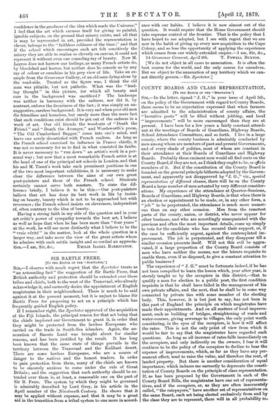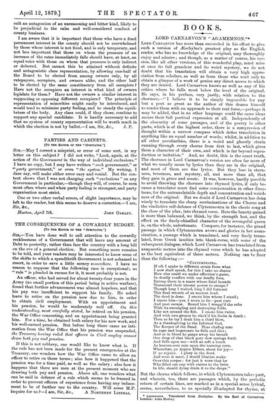C017NTY BOARDS AND CLASS REPRESENTATION..
[TO THE EDITOR OF THE "SPECTATOR."]
Sia,—In the letter, signed "J'. G.," in your issue of April 5th„ on the policy of the Government with regard to County Boards, there seems to be an expectation expressed that when farmers are admitted to the administration of county affairs, the "lucrative posts" will be filled without jobbing, and local " improvements " will be more encouraged than they are at. present. I have been for a few years a fairly constant attend- ant at the meetings of Boards of Guardians, Highway Boards, School Attendance Committees, and so forth. I live in a large county, where the county business is admirably conducted by men among whom are members of past and present Governments,. and of every shade of politics, most of whom are constant in their attendance at their Boards of Guardians and Highway Boards. Probably these eminent men would all find seats on the- County Board, if they are not, as I think they ought to be, ex officio. members of it. But if the constitution of the County Board is founded on the general principle hitherto adopted by the Govern- ment, and apparently not disapproved by "j. G.," viz., special representation of different classes, there will be on the County Board a large number of men actuated by very different consider- ations. My experience of the attendance at Quarter-Sessions,. Boards of Guardians, and Highway Boards, is that when there is an election or appointment to be made, or, in any other form, a " job " to be perpetrated, the attendance is much more numer- ous than on any other occasion. Men from the remotest parts of the county, union, or district, who never appear for other business, and who are accordingly unacquainted with the- previous and often the most important details, come rip simply to vote for the candidate who has secured their support, or, if the case be sufficiently urgent, against the contemplated im- provement. The job is perpetrated, and they disappear till a similar occasion presents itself. Will not this evil be aggra- vated, if a large proportion of the County Board consists of men who have neither the means, nor the leisure requisite to enable them, even if so disposed, to give a constant attention to- public business ?
The experience of" J. G." must be fortunate indeed, if he has not been compelled to learn the lesson which, year after year, is sternly taught us by the occupiers in this district,—that to- qualify a man for election to a public post, the first condition requisite is that he shall have failed in the management of his own private affairs, and the next, that he shall be in some way connected by private ties with some member of the electing body. This, however, it is but just to say, has not been in this part of England the principle on which magistrates have made their appointments. And, on all matters of local improve- ment, such as building of bridges, straightening of roads and water-courses, giving sewerage to villages, the only point worth considering, in the eyes of the occupiers, is how it will affect the rates. This is not the only point of view from which it would be fair to say that the magistrates have regarded such questions. As long as all increase of rates falls immediately on. the occupiers, and only indirectly on the owners, I fear it will continue to be the policy of the occupiers to decline to bear the expense of improvements, which, as far as they have any per- manent effect, tend to raise the value, and therefore the rent, of landed property. But there is another consideration of equal importance, which induces me earnestly to deprecate the consti- tution of County Boards on the principle of class representation. If, as has been proposed by the Government in each of the County Board Bills, the magistrates have one set of representa- tives, and if the occupiers, or, as they are often inaccurately called, "the ratepayers," have another set of representatives on the same Board, each set being elected exclusively from and by the class they are to represent, there will in all probability re-
snit an antagonism of an unreasoning and bitter kind, likely to be prejudicial to the calm and well-considered conduct of .county business.
I am aware that it is important that those who have a fixed permanent interest in the county should not be overwhelmed by those whose interest is not fixed, and is only temporary, and not less important that those on whom the pressure of an increase of the rates immediately falls should have, at least, an ,equal voice with those on whom that pressure is only indirect or deferred. But cannot this be attained without definite and antagonistic class representation, by allowing one-half of the Board to be elected from among owners only, by all ratepayers, occupiers, and owners alike, and the other half to be elected by the same constituency from all occupiers ? Have not the occupiers an interest in what kind of owners legislate for them P Have not the owners a similar interest in supporting or opposing different occupiers The principle of representation of minorities might easily be introduced, and would tend to minimise party feeling, and to steady the equili- brium of the body. Any class could, if they chose, combine to support any special candidate. It is hardly necessary to add that no system of county representation will be worth much in
which the election is not by ballot —I am, Sir, &e., J. P.



































 Previous page
Previous page